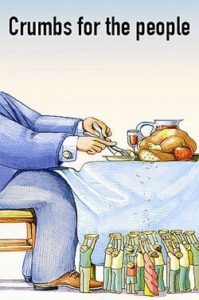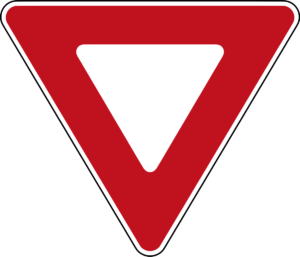Trickle-Down Economics: 낙수 경제
Ronald Reagan’s economic policies,
dubbed “Reaganomics”, included
large tax cuts and were characterized
as trickle-down economics.
In this picture, he is outlining
his plan for the Economic Recovery
Tax Act of 1981 from the Oval Office
in a televised address, July 1981
Trickle-down economics,
also called trickle-down theory,
refers to the economic proposition
that taxes on businesses and
the wealthy in society should be
reduced as a means to stimulate
business investment in the short term
and benefit society at large
in the long term.
In recent history,
the term has been used by
critics of supply-side economic
policies, such as “Reaganomics.”
Whereas general supply-side
theory favors lowering taxes overall,
trickle-down theory more specifically
targets taxes on the upper end
of the economic spectrum.
The term “trickle-down”
originated as a joke by humorist
Will Rogers and today is often used
to criticize economic policies which
favor the wealthy or privileged
while being framed as good for
the average citizen.
David Stockman, who as
Ronald Reagan’s budget director
championed Reagan’s tax cuts at first,
later became critical of them
and told journalist William Greider
that “supply-side economics” is
the trickle-down idea:
It’s kind of hard to sell
‘trickle down,’ so the supply-side
formula was the only way to get
a tax policy that was really
‘trickle down.’ Supply-side is
‘trickle-down’ theory.
— David Stockman, The Atlantic
Political opponents of the Reagan
administration soon seized on
this language in an effort to brand
the administration as caring only
about the wealthy.
Some studies suggest a link
between trickle-down economics
and reduced growth.
Trickle-down economics
has been widely criticized
particularly by left-wing
(socialist and social liberal)
and moderate politicians and
economists, but also some right-wing
(conservative) politicians.
A 2019 study in the Journal
of Political Economy found,
contrary to trickle-down theory,
that “the positive relationship
between tax cuts and employment
growth is largely driven by tax cuts
for lower-income groups and that
the effect of tax cuts for the top 10 percent
on employment growth is small.”
Insight
낙후경제는 소위 레이건의
경제정책을 말하는데 부자들을 위한
정책이며, 말하자면 부자들의 밥상에서
떨어진 것을 거둬 먹으라는 것으로
세금을 내는 시민들에게 강력한 비판을 받고
역사의 뒤안길로 사라진 정책이다.
이 것은 마치 거꾸로 선 삼각형이 홀로 서있는
위험한 경제모습과 같다.
삼성, 현대, LG 등, 등 한국의 대기업은
세계의 경제에 뛰어든 선두주자들로서
정말 훌륭한 역사를 창조해 냈다고
말할 수 있고 국민에게 박수갈채와
큰상을 받아야 된다고 생각한다.
그러나 레이건의 역삼각형경제정책은
미국과 서방국가에서는 이미 오래전에
사회의 악으로 경제성장에 큰 손실이
되었다는 것이 증명됐으며 역사의
뒤안길로 사라졌다.
한국의 다양한 분야의 소기업(small business),
중소기업도 국민의 세금혜택을 받고
소비자의 관심과 지지(support)로
더욱 튼튼해져야 넓고 안정적인
직사각형의 경제가 이루어 지리라 생각된다.
아울러 세계에 큰 영향력을 가지고 있는 미국과
서양문화에서는 “노블레스 오블리주”라는
말은 낙후된 합성어로 뼛속까지 평등한
나라에서는 시민의 눈살을 찌푸리게하는
불편한 단어라는 것을 염두에 두면 좋을 것 같다.
-Economic View-
좋은글 감사합니다
http://www.loaloachristiannetwork.com/
<Photo & Info from app>

